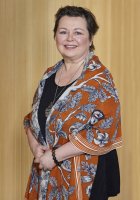#EU STANDARDIZATION STRATEGY
Green. Digital. Future-oriented.
Expert talks on 9 June 2022
A co-operative event of

These were the Expert Talks on 9 JunE 2022
Austrian Standards recently welcomed around 80 high-level experts to examine various aspects and impacts of the EU's new standardization strategy in fascinating talks.
In her keynote speech, Sophie Müller who heads the Standards Policy unit at DG GROW of the European Commission provided insights into the development of the new standardization strategy and how China had contributed to it.
A clear finding is that standards play a significant role in ensuring that Austria and Europe stay competitive and future-oriented in an international context.
There is still some work to be done to make sure that Austria and Europe continue to be competitive and future-oriented in an international context. And standards play a key role here.
There was agreement on the following insights:
Standards – the (still) unknown ENTITIES
Standards form part of our everyday life, but many people are not aware of their importance. Greater understanding of standards and the benefits of standardization have to be promoted in a better way.
Standardization is a top-management task
Today's internal market would not work properly without standardization. Therefore, this issue has to be discussed more intensively in boardrooms as this is where decisions are made on the involvement in standardization. Even in the European Parliament, it is difficult to find MEPs who are familiar with standardization. Understanding of this issue has been neglected in recent years and should be communicated more strongly now.
A race against time
Existing problems have to be resolved quickly. Above all, this relates to the time it takes until a new standard is published. When it comes to major investment decisions, the need for standardization should be considered right from the start as it is too late to think about it at the end of projects.
Digital transformation and legislation
A comparison of the new European and the Austrian standardization strategy shows that Austria is positioned well in classical areas whereas it lags behind in the field of new technologies. In particular, this concerns the digital transformation where AI is a major key theme of the future.
Opposing views clash in discussions on internet protocols, surveillance and democratic values. Even the best legal regulations are pointless if their technical implementation does not work. The way in which data should be handled must be developed in standardization.
China on the way to the top
China's standardization strategy was presented by the Prime Minister and is given top political priority. China intends to become the global leader in international standardization. And the country is already among the top players with regard to proposals for new work items in standardization.
While the German standardization institute DIN still ranks first with regard to the number of secretariats held, China has worked its way up from 6 to 75 secretariats managed for the International Organization for Standardization (ISO) within a few years. In Europe there are not enough experts for keeping pace here.
Experts wanted for the future
Unless young professionals become active in standardization, Austria – and Europe as well – will fall behind. One option for preventing a lack of experts is to integrate standardization into education and training. The availability of resources and competences constitutes a great challenge.
Read more under "Speakers & expert talks".
- Georg Konetzky
- Sophie Müller
- Hatto Käfer
- Peter Maydl
- Christian Gabriel
- Daniel Herbst
- Michaela Radl
- Markus Dielacher
- heinz Kogler
- Betty Xu
Mag. Georg Konetzky, Director of DG National Market Strategies, Federal Ministry of Digital and Economic Affairs (BMDW)
IMPACT of the EU Standardization Strategy on Austria
Georg Konetzky highlighted how high the expectations placed in standardization were and that it was important to reduce adjustment costs. This would facilitate the uptake of new technologies and products. Moreover, the prioritization and identification of focuses should be given more attention.
The EU Standardization strategy from the BMDW's perspective
Standardization has a different legal basis and organization in the individual member states of the Union. The EU Standardization Strategy aims at making standards a key element of a resilient, green and digital internal market of the EU and strengthening the role of the European standardization system world-wide.
The BMDW made several suggestions on the preparatory roadmap of the Commission from an expert perspective. This contribution and elements of the Austrian standardization strategy are compared with the EU Standardization Strategy addressing common aspects as well as challenges.
About the speaker
Since 2019, Georg Konetzky has headed DG National Market Strategies of the Federal Ministry for Digital and Economic Affairs (BMDW). Hence, he is in charge of trade law, electrical engineering, conformity of fire arms, vocational training, market surveillance, accreditation, standardization, metrology and surveying, oversight of the Economic Chambers, the Chamber of Tax Advisors and Public Accountants, the Chambers of Architects and Chartered Engineering Consultants, the audit federations of co-operatives and co-ordination of economic crisis prevention.
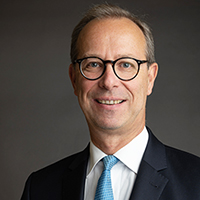
Mag. Georg Konetzky
© BMDW/Hartberger
Sophie Müller M.A., MAES, Head of Unit, Standards Policy, DG GROW, European Commission
The keynote address was presented by Sophie Müller who had come from Brussels specifically for that purpose. She reported on how it came about that a new standardization strategy was developed and how China had contributed to this.
She gave an overview of the five chapters realizing the Standardization Strategy. Important fields of action were the geopolitics of standardization, good governance, definition of priorities and speed.
Furthermore, she informed that Maive Rute was appointed to the new position of Chief Standardization Officer playing a key intermediary role as per 1 June.
The EU Standardization Strategy from the perspective of the European Commission
In early February, the European Commission adopted the new Standardization Strategy. It sees standardization as an issue of great importance for the future of Europe and aims at intensifying co-ordination among different stakeholders, for example by introducing a co-ordinator within the European Commission (Chief Standardization Officer) who keeps an eye on strategically significant standardization policies.
In addition, a high-level forum was set up bringing together the Commission, researchers, civil society, industry, member states and standardization organizations. This task force is to identify important subjects for standardization earlier. This is expected to have a positive impact on the implementation of standardization projects and ensure a more targeted approach to important subject fields.
About the speaker
Sophie Müller has headed the Standards Policy unit of DG GROW – responsible for the internal market, industry, entrepreneurship and SMEs – within the European Commission. In her function, she is in charge of deploying and improving standardization as an instrument for supporting a green, digital and resilient internal market.
In 2010, Sophie Müller’s career started at DG GROW of the European Commission where she has been in charge of subjects such as key technologies and corporate social responsibility. She has worked at the offices of the director general and deputy director generals of DG GROW for 6.5 years, providing advice on policies such as the EU industrial policy, the Circular Economy Action Plan and sectoral issues related to the automotive, chemical and tourism industry. She graduated in political science and advanced European studies from the Universities of Bonn (DE) and Basel (CH).
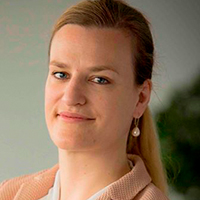
Sophie Müller M.A., MAES
© European Commission
Dr. Hatto Käfer, Head, Economic Team, Representation of the European Commission in Austria
The legal framework – current survey
Dr. Hatto Käfer presented an initial evaluation of the EU Standardization Strategy. One of the outcomes was that deviations from product regulations had become more and more frequent, for example in the field of AI. Therefore, consideration was given to the question of whether digital CE marking made sense.
Design of the New Legislative Framework (NLF) – consumer safety, gateway to European markets
The “New Legislative Framework” comprises the field of “harmonized standards”, i.e. the standards developed under an “EU mandate”. The principle: The EU defines the essential requirements (e.g. reduction of CO2), while standards deal with important details (definitions, measurement methods...). At present, around 17% of ÖNORM standards are harmonized standards. Within the context of the Batteries Regulation, a debate has been revived: For newer legislative acts (e.g. Machinery Regulation, artificial intelligence), the Commission wants to reserve the right to issue “technical specifications” in the event that the adoption of a harmonized standard fails. This is seen critically by standardization organizations and enterprises.
In November, the European Commission launched a consultation on whether the New Legislative Framework was still appropriate that ended on 11 January 2022. Austrian Standards also submitted comments. Report on the results and outlook.
About the speaker
Hatto Käfer heads the economic affairs team of the Representation of the European Commission in Austria. He has worked in various positions for the European Commission both in Brussels (Office for Infrastructure and Logistics; Planning and Budget unit of DG Communication), notably as head of the Historical Archives, and in Vienna since 1996. At the Court of Justice of the European Communities in Luxembourg, he headed the Press and Information unit.
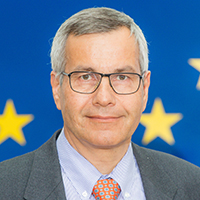
Dr. Hatto Käfer
© European Commission
Dipl.-Ing. Dr. Peter Maydl, chair of Committee 271 “Sustainability of construction works” at Austrian Standards
Brevity is the soul of wit
Dipl.-Ing. Dr. Peter Maydl made clear that the concept of sustainable construction works still had a long way to go to be applied everywhere. Standards had to be shorter, clearer and more easily understandable so that they could be used effectively. The rules applicable in the field of sustainable construction works were too extensive to get a quick overview.
Green Deal - A paradigm shift is imminent in the construction industry
The construction industry has to play a special role in the implementation of the European Green Deal. At present, the building stock accounted for around 40% of energy consumption in the EU. Refurbishment instead of new buildings, recycling of demolition waste as well as the use of resources are top priorities. For a complete assessment of the environmental impacts and costs of building structures it is necessary to evaluate their entire life cycle (environmental footprint, life cycle costs).
In this context, standardization fulfils an important function. But what about the application of standards in practice? Which benefits do they offer? Do the standards needed already exist, but nobody is aware of them? And how can all stakeholders be brought on board? Peter Maydl, chair of Committee 271 "Sustainability of construction works" set up in 2021, explained the progress made in standardization at the national and European level and highlighted areas in which action was urgently needed.
About the speaker
Peter Maydl is consulting engineer for construction and court-certified expert (building materials and building material tests, sustainability of construction works). Until 2014, he headed the Institute for Materials Testing and Building Material Technology at the Graz University of Technology. For 30 years, he has focused on sustainable construction works in his research and teaching activities (e.g. as initiator of the university course on sustainable building jointly offered by the two universities of technology in Graz and Vienna). He has taken part in the work of CEN/TC 350 "Sustainability of construction works" as an Austrian delegate for 17 years and has chaired the new Committee 271 "Sustainability of construction works" at Austrian Standards since 2021.
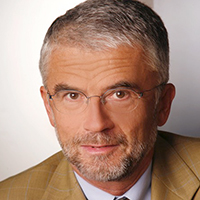
Dipl.-Ing. Dr. Peter Maydl
© Peter Maydl
Dipl.-Ing. Christian Gabriel, Head of OVE Standardization and Deputy Secretary-General of OVE
Dipl.-Ing. Christian Gabriel sees a great need for action in new fields of standardization. Asian companies have a stronger presence in the technologies of the future than European enterprises. Europe has to keep up and get ready to cope with their growing influence. One of the key areas is the promotion of young professionals.
OVE – Best practices in scaling up standards and standardization activities
Forecasts on future trends show that the spheres of life and production are changing. Wherever "smart technologies" – regardless of whether they relate to smart cities, smart homes, smart farming, smart manufacturing, smart cars or smart weather forecasting – are used, standards are needed. The focus is on networking different objects, which is made possible, in particular, by the massive expansion of the internet of things (IoT), 5G networks, AI-driven automation as well as digital platforms and ecosystems.
Energy technology, information technology, microelectronics, robotics as well as measurement and automation technology are the five top subjects currently addressed by the Austrian Electrotechnical Association (OVE). To succeed in these fields, enterprises have to work on an international scale.
Christian Gabriel provides insights into international co-operation on electrotechnical standards, the promotion of diversity and the next generation in this field, the subjects with particularly intensive involvement of Austrian experts and the criteria applied by OVE in defining subject-specific priorities.
About the speaker
Christian Gabriel, born in Upper Austria, has headed the Standardization Department of OVE since 2004. He has represented Austrian interests in electrotechnical standardization also at the European and international level for many years. Since 2019, Christian Gabriel has been a member of the Standardization Management Board of IEC. He also highlights the special importance of standardization as a university teacher, court-appointed expert and consultant.
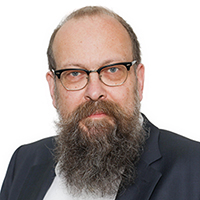
Dipl.-Ing. Christian Gabriel
© OVE/Christian Fürthner
Dipl.-Ing. Daniel Herbst, Graz University of Technology, Institute of Electrical Power Systems
Getting young professionals on board
Dipl.-Ing. Daniel Herbst presented a picture of the mood at universities. Young engineers have a rather negative opinion of standardization. It is perceived as uninteresting, dusty and outdated as well as irrelevant for their own interests. It would be highly important to develop programmes and opportunities promoting the involvement of young professionals in the standardization process.
Young professionals and the future of standardization
Climate crisis, war in Ukraine, social inequities... the so-called young professionals have to deal with numerous challenging issues of the future. Consequently, they are strikingly more politically active, more committed and more socially oriented than the previous generation. The multi-facetted opinions, views, knowledge and creativity of the young professionals harbour an enormous potential. Taking part in standardization means shaping the future.
Which tools and opportunities do we have to offer the next generation in order to open up the world of standardization to them? Which levers do we have to move in research and education in order to raise awareness of the opportunities of standardization in the next generation and to encourage it to take part in shaping standards? Which framework conditions do we have to create?
Those and other exciting questions were discussed in the expert talk on "Young professionals and the future of standardization" by Daniel Herbst.
About the speaker
Daniel Herbst studied electrical engineering, specializing in power engineering, at Graz University of Technology and worked in the team of an electrical consultancy in the areas of planning, tendering and construction supervision for five years. In his current work at the Institute of Electrical Power Systems of Graz University of Technology, he deals with the fields of low voltage systems, protection concepts, standardization (OVE TSK E06/07/08, WG Charging Stations, etc.) and charging infrastructure for electric vehicles.
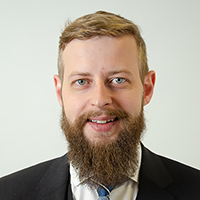
Dipl.-Ing. Daniel Herbst
© Graz University of Technology
Dr. Michaela Radl, Sales And Marketing Specialist, Purency; ISO Austrian Delegate
Dr. Michaela Radl (winner of the Living Standards Award) explained why Purency is active in international standardization. Based on machine learning, the Viennese company allows laboratories to perform scalable analyses of microplastics. Here, standards help define standardized work processes ensuring reliable, reproducible and comparable results.
Austria's enterprises - Innovative and successful with standards
Small and medium-sized enterprises (SMEs) form the backbone of Austria's economy: 99.6% of all companies are SMEs. The European standardization strategy explicitly promotes a standardization system that guarantees that SMEs have a voice. More than half – 50.87%, to be precise – of all enterprises and organizations delegating experts to the committees and working groups of Austrian Standards are SMEs.
Two Living Standards Award winners illustrate how Austrian enterprises succeed based on the development and application of standards: Michaela Radl from the Viennese start-up Purency explains how microplastics can be measured with the help of machine learning, while Markus Dielacher from Graz-based BDI-BioEnergy International shows how quality control of algal oil is ensured for customers.
About the speaker
Michaela Radl
Klagenfurt-born Michaela Radl studied at the University of Graz until 2011, obtaining a Bachelor's and Master's Degree in earth sciences. Subsequently, she researched at the Queen Mary University of London during her phD studies until 2017. While she worked for WebMediaSolutions in Klagenfurt, she trained to become an internationalization assistant. Since December 2021, she has supported the Purency team in marketing the Microplastics Finder software.
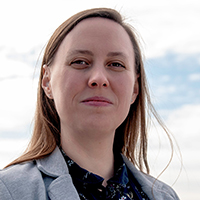
Dr. Michaela Radl
© Purency GmbH
Dipl.-Ing. Markus Dielacher, CEO BDI-BioEnergy International GmbH
Dipl.-Ing. Markus Dielacher (winner of the Living Standards Award) reports that his company developed a chemical recycling method that can be used to produce new products from old ones and process recycled products like plastics. As there are no standards on this method, the classification of the products is difficult. This lack of clarity results in obstacles for the approval and sale of these products.
Austria's enterprises - Innovative and successful with standards
Small and medium-sized enterprises (SMEs) form the backbone of Austria's economy: 99.6% of all companies are SMEs. The European standardization strategy explicitly promotes a standardization system that guarantees that SMEs have a voice. More than half – 50.87%, to be precise – of all enterprises and organizations delegating experts to the committees and working groups of Austrian Standards are SMEs.
Two Living Standards Award winners illustrate how Austrian enterprises succeed based on the development and application of standards: Michaela Radl from the Viennese start-up Purency explains how microplastics can be measured with the help of machine learning, while Markus Dielacher from Graz-based BDI-BioEnergy International shows how quality control of algal oil is ensured for customers.
About the speaker
Markus Dielacher
For more than 20 years, Markus Dielacher has made essential contributions to the development of sustainable technologies at BDI-BioEnergy International. Since 2018, he has been responsible for the strategic development and the success of the company as its CEO.
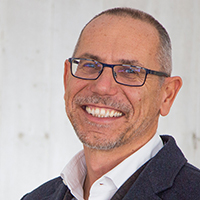
Markus Dielacher
© BDI-BioEnergy International GmbH
Heinz Kogler, MBA, Co-ordinator of the Enterprise Europe Network Austria, Austrian Federal Economic Chamber (WKO), Deputy Head of the European Policy Department of WKO
Heinz Kogler, MBA, provided information on the Enterprise Europe Network that supports companies in using standards appropriately with the focus being on product conformity, product safety and standards research.
Austria's enterprises - Innovative and successful with standards
Small and medium-sized enterprises (SMEs) form the backbone of Austria's economy: 99.6% of all companies are SMEs. The European standardization strategy explicitly promotes a standardization system that guarantees that SMEs have a voice. More than half – 50.87%, to be precise – of all enterprises and organizations delegating experts to the committees and working groups of Austrian Standards are SMEs.
Heinz Kogler of the Enterprise Europe Network provided insights into the manifold opportunities for obtaining support on issues related to going international and finding co-operation partners. The activities of EEN Austria are co-funded by the European Commission, the Federal Ministry for Digital and Economic Affairs and the governments of the Austrian provinces.
About the speaker
Heinz Kogler
Heinz Kogler works at the European Policy Department of WKO and heads the Enterprise Europe Network in Austria. He is specialized in consulting SMEs on issues related to the internal market, CE marking, EU funding programmes and instruments of co-operation between enterprises.
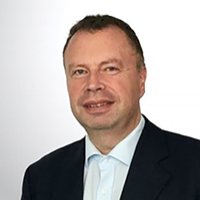
Heinz Kogler, MBA
© EEN
Dr. Betty Xu, Director, Seconded European Standardization Expert in China (SESEC) at CEN, CENELEC, ETSI, EC and EFTA funded project
China's Standardization Strategy
Dr. Betty Xu presented the Chinese standardization strategy and its geopolitical implementation. The development of standards is closely monitored from 2025 to 2035 in order to see which systems can best support China's policies. The main objective of the strategy is to employ standards in order to promote high-tech innovations. There are many new factors and developments as to how China deploys standards as a political power or uses them as tools for achieving its own political aims.
China – Geopolitical power through standards
The government of China has a standards law that motivates and supports science and companies to actively participate in international standardization work. China is providing significant strategic impetus here and has been increasingly involved in international rule-setters such as ISO (International Organization for Standardization), IEC (International Electrotechnical Commission) and ITU (International Telecommunication Union) for several years. At ISO alone, the number of Chinese technical committees has doubled in the last eleven years.
In the digital expert talk session "China - geopolitical power through standards?", Betty Xu provides exciting insights into China's strategy for technology leadership, the Belt and Road Initiative and standard-essential patents and their impact on the European economic area.
About the speaker
Betty Xu took the position as Seconded European Standardization Expert, SESEC, in China in September 2014. SESEC is a project co-funded by European Commission, EFTA and three official European SDOs (CEN, CENELEC and ETSI). The purpose of the project is to support EU-China co-operation in standardization.
Betty Xu was born in China and got her Bachelor’s and Master’s Degree at Shandong University of China and majored in Electrical Engineering. She then earned her Doctor’s Degree in Electrical Engineering at The University of Queensland of Australia in 2006.
Betty Xu has more than 10 years’ experience in industry, first as the software/hardware developer at an IT/automation company (from 2000-2002), R&D leader in a big household appliance company (2006-2008) and then as Standardization Director in a giant European electrical equipment manufacturer (2008-2013). Dr. Betty Xu migrated to Australia and worked for Standards Australia from 2013 to 2014.
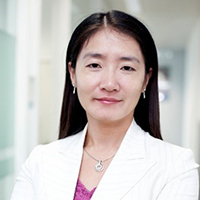
Dr. Betty Xu
© Dr. Betty Xu
On 2 February 2022, the European Commission presented its new Standardization Strategy. It aims at intensifying co-operation, increasing speed and ensuring a clear focus in the development of standards.
The objective is to make standards a key element of a resilient, green and digital EU internal market and to strengthen the role of the European standardization system.
- What are the next steps?
- What does that mean for Austria's economy?
- Which policy objectives are linked with the EU Standardization Strategy?
- Which role do standards play in achieving the climate targets?
- Which impact does this have on standardization work?
- And where do the experts come from for the challenges of the future?
Our expert talks held on 9 June 2022 provided first-hand information on Europe's way and examined various aspects of its impacts on Austria.
A flying start is necessary to address the most urgent challenges. This requires close collaboration among stakeholders going beyond the current status as well as a common strategic view of the future: new standardization experts are lacking in important technology sectors.
A report on the talks is available under the "Review" tab.
Details on the presentations are provided under the "Speakers & expert talks" tab.
The Programme
9:00 a.m. Opening
Dr. Valerie Höllinger, MBA, MBL, Austrian Standards, and
Dipl.-Ing. Christian Gabriel, OVE
9:15 a.m. The EU Standardization Strategy from the perspective of BMDW
Mag. Georg Konetzky, Director, DG National Market Strategies, BMDW
9:30 a.m. The EU Standardization Strategy from the perspective of the European Commission
Sophie Müller M.A., MAES, Head of Unit, Standards Policy, DG GROW,
European Commission
10:00 a.m. Coffee break
Parallel Sessions
10:15 a.m. Design of the New Legislative Framework (NLF) –
Consumer safety, gateway to European markets
Dr. Hatto Käfer, Head, Economic Team, Representation of the European Commission
in Austria
10:15 a.m. Young professionals and the future of standardization
Dipl.-Ing. Daniel Herbst, Graz University of Technology, Institute of Electrical Power
Systems
10:45 a.m. Short break
10:50 a.m. OVE – Best practices in scaling up standards and standardization activities
Dipl.-Ing. Christian Gabriel, Head of OVE Standardization and Deputy Secretary-
General of OVE
10:50 a.m. Green Deal - A paradigm shift is imminent in the construction industry
Dipl.-Ing. Dr. Peter Maydl, Chair of Committee 271 "Sustainability of construction
works" at Austrian Standards
11:20 a.m. Short break
11:25 a.m. Austria's enterprises - Innovative and successful with standards
Dr. Michaela Radl, Sales and Marketing Specialist, Purency, ISO Austrian Delegate
Dipl.-Ing. Markus Dielacher, CEO BDI-BioEnergy International GmbH
Heinz Kogler, MBA, Co-ordinator of the Enterprise Europe Network Austria,
Austrian Federal Economic Chamber (WKO), Deputy Head of the European Policy
Department of WKO
11:25 a.m. China – Geopolitical power through standards
Dr. Betty Xu, Director, Seconded European Standardization Expert in China (SESEC)
at CEN, CENELEC, ETSI, EC and EFTA funded project
12:05 p.m. End of the expert talks - networking buffet lunch
Further information on the EU Standardization Strategy:
On the website of the European Commission
Austrian Standards press release
